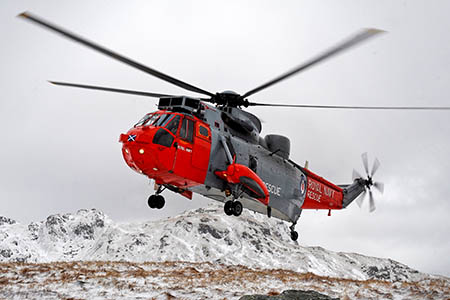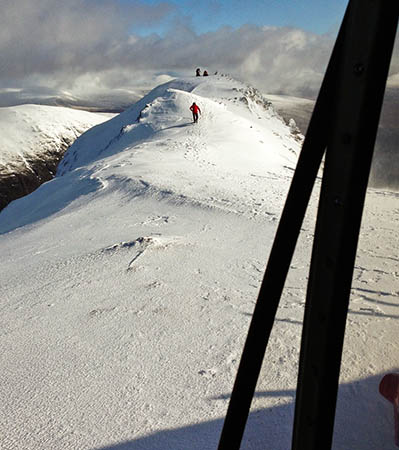Two walkers were airlifted from a Glencoe mountain after spending the night on the peak.
The crew of a Royal Navy Sea King helicopter battled 60mph winds in the rescue and had to abort one attempt to get to the two men on Buachaille Etive Mòr.
The pilot said he was worried his aircraft would be blown off the summit ridge during the rescue on the 1,022m (3,353ft) peak.
The two walkers had to make an unscheduled bivvy on the mountain-top yesterday in icy winds.
The Royal Navy said the pair were mildly hypothermic and very tired. One of them had a minor leg injury, but they were otherwise unharmed.
They had not intended to spend the night on the Buachaille but had got caught out in the conditions as darkness fell. The men were well equipped and raised the alarm in the morning.
The Royal Navy crew from HMS Gannet in Ayrshire was scrambled at 9am and flew to Glencoe and the Glencoe Mountain Rescue Team was called out and made its way to the foot of the mountain. The helicopter crew quickly found the walkers but the strong winds were creating both strong up- and downdraughts.
Lieutenant Commander Martin Lanni, aircraft commander and one of the Sea King pilots, said: “Although we found the walkers very quickly, we had to abort our first attempt to get in close to them.
“The helicopter was caught in a strong downdraught and, as we were unable to hold any kind of stable position safely, we were forced to fly away from the scene.
“At the second attempt, however, we did manage to get in closer. We considered winching to reach them, but, again, the volatile, strong wind – this time creating strong updraughts – was causing us to have to fight to maintain any kind of steady hover.
“We elected instead to try and land the helicopter, which we did manage relatively close to the walkers, although I was concerned the updraughts might actually blow us off the mountain.

The crew was worried the nine-tonne aircraft would be blow off the ridge. Photo: Stuart Hill/MoD/Crown Copyright
“It was one of the few times I wished the 9.5-tonne helicopter was a bit heavier.
“The summit of the mountain was completely covered in snow and the bitterly cold wind was whipping up clouds of ice, even though the sky looked clear and sunny.
“Our observer Lieutenant Commander Rob Suckling battled his way across to the walkers – at one point he had to sit down on the snow for fear he was going to be blown over on the exposed ridge – checked they were OK and got them safely on board the aircraft.
“I’d say they were pretty relieved to see us.
“We then transited carefully down the mountain to deliver them into the care of Glencoe Mountain Rescue Team at the bottom.”
The helicopter, by then light on fuel, diverted to Killin to take on more before returning to base at Prestwick.
A Royal Navy spokesperson said: “The men and women of HMS Gannet serve on a frontline, albeit one within the UK, in the mountains and above the seas of Scotland, northern England and Northern Ireland.
“But, for some of the aircrew who have returned from serving in Afghanistan, whether with the Royal Navy, the Royal Marines or on exchange with the other services, it is an ideal environment to maintain skills used in operational theatre, while for others the terrain offers an excellent training ground in advance of deployment.
“The sometimes extreme weather, harsh mountainous terrain and the skills involved in not only operating the aircraft and equipment, but also in conducting rescues and saving lives within a hostile environment, combines to make it an exceptional preparation ground for serving alongside their forces colleagues in the skies of Afghanistan.”
In recent years, several members of the unit have been recognised for some of their endeavours and bravery, including four Air Force Crosses and one Queen’s Gallantry Medal.

Alex Parr
06 March 2014Great work guys, well done. Thanks.
Margaret
06 March 2014With regard to the remarks above about training and experience, perhaps the Government should have thought a bit more about providing new aircraft for the service before handing helicopter rescue over to the private sector.
As noted in the news today the cut back in the Armed Services appears to have been a purely finacial decision made by the Treasury - the military head, General Sir Peter Wall wasn't even asked for his opinion, according to the Commons defence select committee.
OutdoorsAndy
08 March 2014Benighted, harsh. Glad it all ended well :D